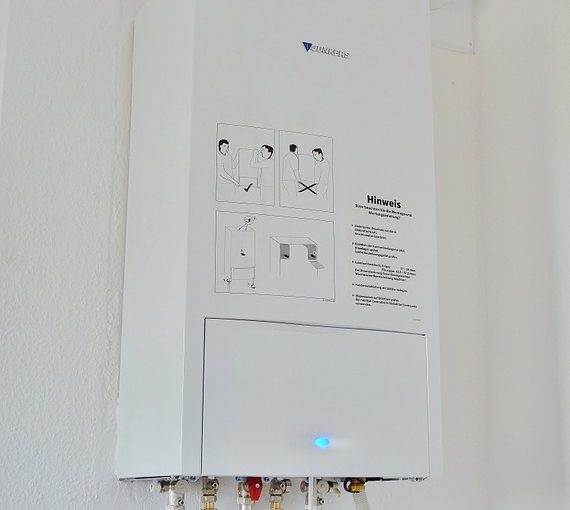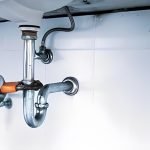Whether you’re building a new home or completing a home improvement project, you’ll eventually need a new water heater. That decision used to be relatively straightforward: there were tank water heaters available in gas and electric configurations, and that was that. However, with tankless systems now becoming more prominent in the market, deciding on that new water heater is more complicated. In this article, we’ll address the pros and cons of each type and identify the system that’s best for your home and budget.
All about tankless water heaters
Tankless water heaters, also known as “demand-type water heaters,” represent the cutting-edge in water heater technology, and they’re an increasingly popular option for homeowners looking for an energy-smart, convenient upgrade to their home. These systems are more energy-efficient than tank water heaters: since they only heat water as it’s needed, there’s little energy wasted keeping water warm over sustained periods of time. Over the years, this can add up to major savings for homeowners, especially when you consider that tankless systems can last twice as long as standard water heaters.
Of course, the most famous upside of tankless water heaters is the unlimited hot water. Any homeowner with a large family knows the cold consequences of being the last one to take a shower. That’s because continuous use exhausted the pre-heated supply in a tank water heater. Since tankless systems heat water as it runs through the unit, they eliminate that problem entirely.
As tank water heaters near the end of their lives, there’s a risk that corrosion inside the tank could cause a tank burst—an event with the potential to cause major water damage in your home. Tankless water heaters, on the other hand, do not carry this risk.
Whole-home or one for each room?
Most tankless water heaters are capable of providing hot water to your entire home. However, it’s also possible to “zone” your demand-type water heaters, putting them under sinks and behind showers. This means that you can have near-instantaneous, unlimited hot water at that tap specifically. Whole-home tankless water heaters are limited in their ability to provide hot water to multiple taps, appliances, and faucets simultaneously. By zoning your systems, you won’t have this disadvantage.
Standard water heaters
Tank water heaters, also known as “standard water heaters,” have been a reliable staple of the American home for more than a century. Most homes today still use a standard water heater, and for several good reasons. First, most homes are configured for them. Even though these systems do take up space, many homes have reserved space in the garage, a utility closet, or elsewhere in the home for a water heater, complete with all the needed connections.
Second, these water heaters make up for their capped total hot water supply by being able to provide hot water in large quantities simultaneously. With a tank water heater, you can run your dishwasher, washing machine, and shower at the same time. Since tankless systems heat water as its needed, the total water required at once in such a scenario would probably exceed the demand-type water heater’s ability to keep up.
Comparing performance and costs
Tankless water heaters are the more energy-efficient of your two choices. According to the U.S. Department of Energy, demand-type water heaters use as much as 30% less energy than standard water heaters. When you consider that heating water is the second-largest chunk of energy spent in your home (14%), this can add up to big savings on your monthly utility bills. These savings are even greater with a gas setup, if your home has that option. Gas water heaters run more efficient than electric ones do.
At this point, you may very well be asking yourself why you should consider a standard water heater at all. Well, here’s one thing to consider: tankless systems can cost anywhere from 2-3 times of what a tank water heater typically does. You’ll earn back some of that additional upfront cost in your lower energy bills over the lifespan of the system, and there’s a good chance your tankless unit could outlive two standard ones, but the higher initial investment is something to weigh against the otherwise outstanding benefits of demand-type units. Also, no matter which type of water heater you’re looking at, most gas systems cost more than their electric counterparts.
Which is right for your home?
This answer comes down to a few key factors. If you’re planning on staying in your home for the long haul, you’ll get the most out of the energy savings offered by a tankless water heater. A demand-type system might also make sense if you have a large family and you’re all sick of running out of hot water in the mornings. On the other hand, a standard water heater might be a better fit for your budget. If you’re planning on moving in the very near future, a tankless water heater represents an investment you may not be around to see the long-term returns on.
Better yet, talk to a trusted local plumbing contractor. They’ll be able to make an individualized recommendation that takes into account your home, your local energy costs, and any energy-efficiency upgrade rebates in your area. Plus, once you’ve made your decision, you’ll have a team ready to install your new water heater—no matter which one you choose.
Victoria Sanders is the communications director and plumbing writer at Reimer Home Services , a professional home repair & plumbing company servicing Western New York. Victoria has been working within the home repair & plumbing industry for almost 15 years and enjoys sharing her plumbing knowledge with homeowners and other home repair professionals.







